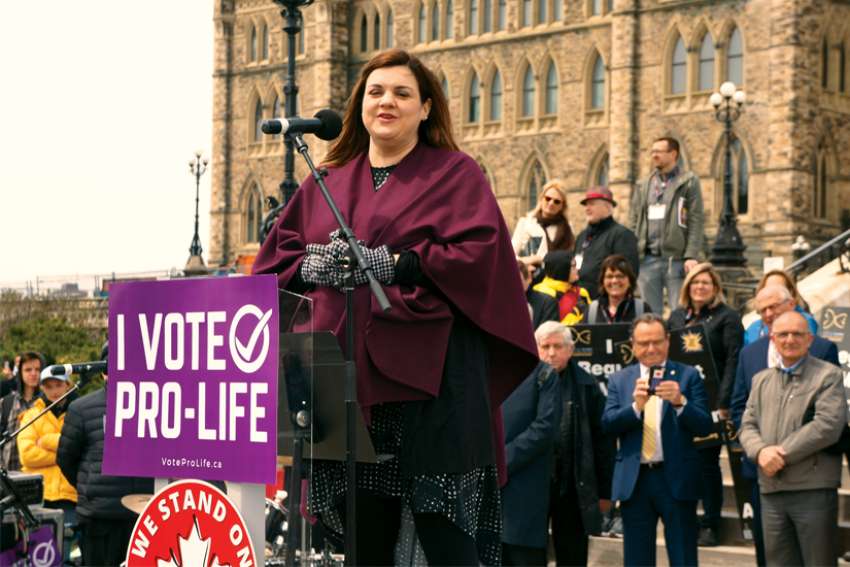These themes aren’t usually the first to pop into one’s head when the subject of abortion comes up. Questions of when human life begins, who owns a woman’s body and the role abortion plays in safeguarding women’s health are among the more common flashpoints in the debate.
Such profound spiritual and theological questions can whip up emotions within the pro-life and pro-choice sides to the point of violence in extreme cases. It’s easy for both sides to fall into the trap of judgmental legalism and even hatred, which, for Christians, goes against all that Christ has taught us in His Gospel.
That’s one of the reasons why the pro-life movie Unplanned, which aired in 56 movie theatres across Canada in July, is so powerful.
In chronicling Abby Johnson’s journey from Planned Parenthood volunteer to clinic director to pro-life advocate, the movie certainly provides clear direction on what we as Christians know to be the truth: life begins at the moment of conception; the taking of a human life is wrong; our bodies belong to God; He determines when we are born and when we die.
But it also presents a reality that we often overlook in our pro-life work: the battle belongs to God.
And the battle is won when we turn to Him in prayer and speak the truth in love, which Unplanned so beautifully illustrates.
When addressing abortion, we sometimes make the mistake of relying primarily on human logic, reason and rhetoric to “win” a debate that has become highly intellectualized and is essentially unwinnable when solely directed by human efforts.
It’s a comparing apples-and-oranges type of debate. The pro-lifers focus on the baby’s rights; the pro-choicers focus on the mother’s rights. Add to the mix subjects such as separation of church and state, misogyny, gender equality and personal autonomy among others, and the debate ends up becoming two totally separate conversations that seem to have little to do with one another and is far removed from the core issue of the right to life.
In the debate, abortion becomes enmeshed in, and identified with, the wider advancement of women in society and the enshrining of women’s rights. That’s what makes the issue so tricky. Very few of us would argue against the concept of women’s advancement and rights in its entirety.
That’s what attracted Abby Johnson to Planned Parenthood in the first place. She desired to help women in crisis and was drawn in by such arguments as equal rights for women and providing safe health care for women. Abortion, which Johnson was initially uncomfortable with, was pushed to the side and submerged into the broader landscape.
When that happens, we become detached from the real meaning and impacts of abortion. Instead, abortion becomes just a routine medical procedure. That’s why Johnson, despite being a kind, compassionate Christian and raised to be pro-life, was able to work for eight years at a clinic that offered abortion.
And that’s where the persistent, passionate prayer comes in.
Early in her work at Planned Parenthood, Johnson formed a relationship of sorts with then-Coalition for Life volunteer Marilisa in what Johnson describes as a “bond of compassion.”
Marilisa, along with her future husband Shawn and hundreds of Coalition for Life volunteers, prayed incessantly for many, many years, not only for Abby but for the women receiving abortions, the staff administering them and the ones victimized by the procedure.
They were praying for an end to abortion that involved opening peoples’ spiritual eyes and hearts to the reality of the practice, a deep revelation of the sacredness of life extricated from, and unclouded by, the political, social and other arguments in which abortion is imbedded in.
In Johnson’s case, that revelation and subsequent conversion came about by witnessing an actual abortion on the computer screen. Through prayer and faith, God brings about many forms of revelation and conversion in many different contexts.
Hand in hand with the prayers is the compassion Marilisa showed to Abby and others going to the clinic: engaging women in respectful, affirming conversation; recognizing what they’re going through, and providing pre- and post-birth support in a non-judgmental way.
We must continue articulating what our faith teaches us about the sacredness of life and putting forth intellectual arguments against abortion. But we must do so in a spirit of persistent prayer, knowing that it’s ultimately God’s love and revelation, channeled through our efforts, that will ultimately lead people away from abortion.
(Majtenyi is a public relations officer who specializes in research at an Ontario university.)


